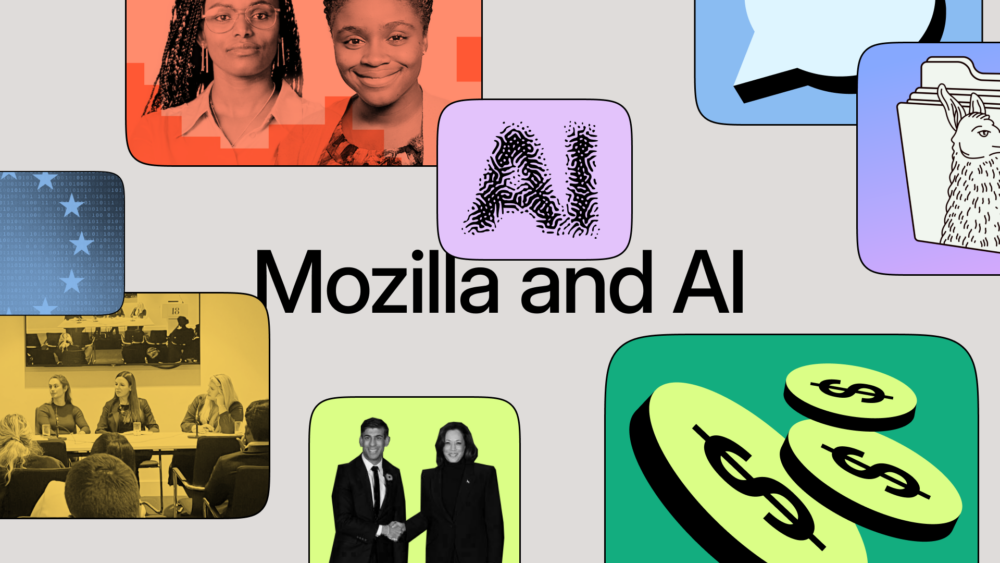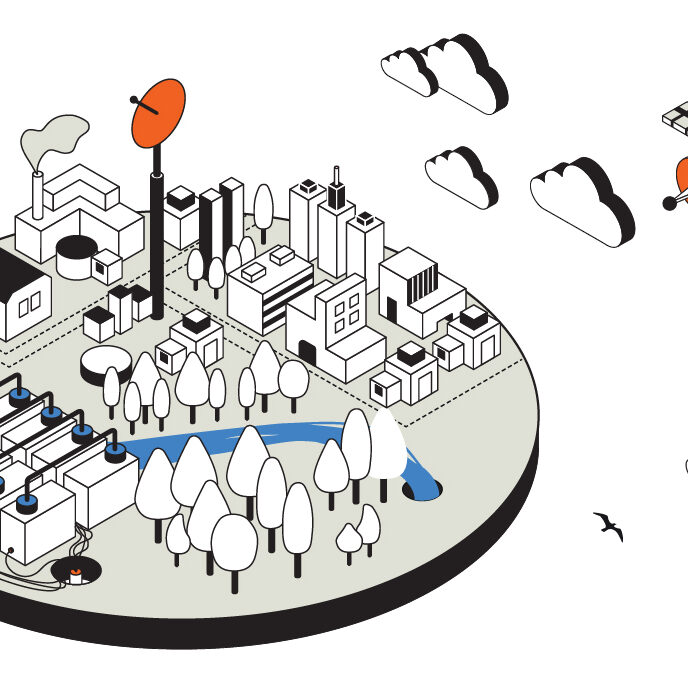Just over a year ago Mozilla launched two big investments in AI — a $35 million investment in a responsible tech fund, Mozilla Ventures and a $30 million investment in a R+D Lab developing trustworthy AI, Mozilla.AI. Since those initial investments, Mozilla has accelerated our efforts to build and deploy AI that adheres to our mission of 25 years — putting people first, while being truly trustworthy and open.
While AI was the story of 2023, the emphasis on AI is not going anywhere. Today’s complex ethical tech landscape is shaped by the rise of AI and its profound impact on society, just as the browser battles shaped the tech landscape of the 90s. Mozilla is focused on using philanthropy, community and collective power, to help create a new status quo where public good instead of profit defines the next wave of AI. The many possibilities of AI, both wondrous and harmful, cannot be ignored, so instead Mozilla has been doing our best to shape the future of AI to be responsible, trustworthy, inclusive and centered around human dignity.
Mozilla is uniquely set up to do this because of our structure as both a nonprofit research hub and a mission-driven, for -profit product organization. Mozilla’s distinct advantage in this moment is the ability to bring together advocacy and product, connecting cause to code and tackling issues in AI from every angle.
This is work we won’t stop doing.
Explore Mozilla’s latest advancements in more detail below :
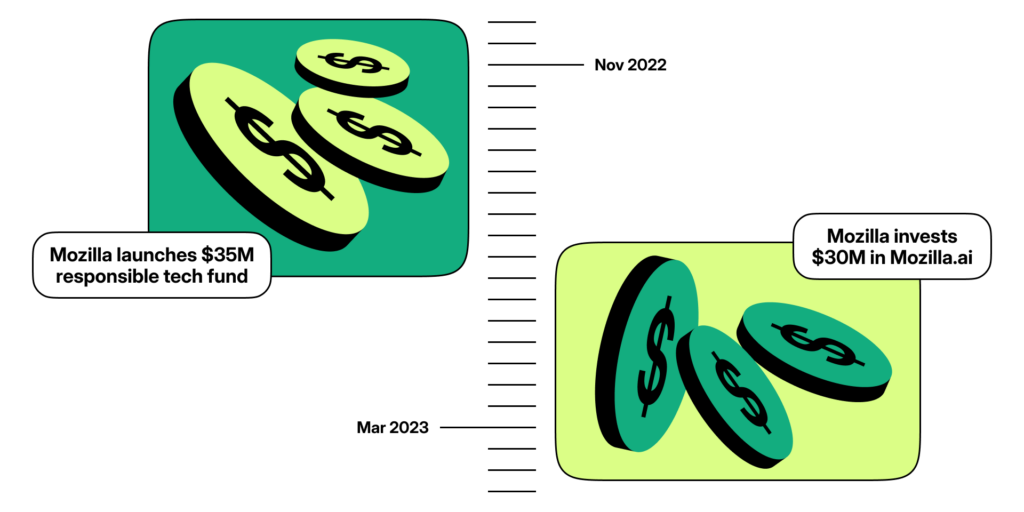
Mozilla launched a venture capital fund for early-stage (seed or series A) startups whose products or technologies protect privacy, decentralize digital power and build more trustworthy AI — advancing privacy, inclusion, transparency, human dignity and other values in the Mozilla Manifesto.
After speaking to thousands of founders, engineers. Scientists, artists, designers and activists who are taking a new approach to AI — one founded in human agency and transparency, but not feeling that new approach from the big tech and cloud companies with the most power, Mozilla announced Mozilla.ai. It is a start-up and community dedicated to building a trustworthy and independent open-source AI ecosystem.
Mozilla, among a larger group of more than 50 notable artificial intelligence researchers, urged European politicians to adopt broader AI regulation and not exclude generative AI from the European Union’s AI Act as co-authors of the brief.
For close to thirty years, commerce has been core to how people use the internet. The global ecommerce scale-up has brought convenience to people’s lives, but also new challenges and bad actors. Enter: Fakespot. Mozilla acquired Fakespot to continue to invest and enhance their sophisticated AI and machine learning (ML) systems to flag deceptive reviews and help people trust and enjoy their online shopping experience more.
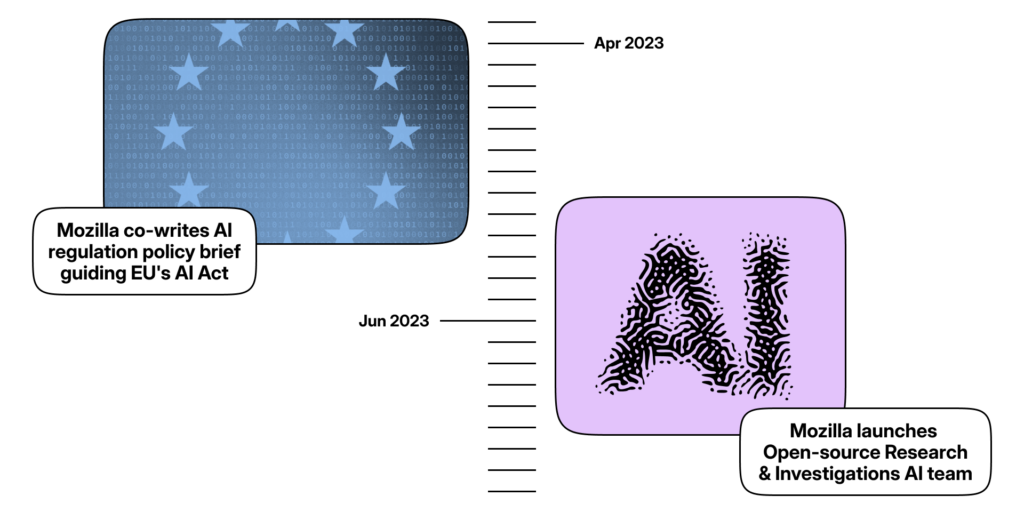
Mozilla brought together some of the brightest thinkers, technologists, ethicists and business leaders who believe in trustworthy AI for a day of talks, workshops and working sessions to help them get their ideas off the ground through Mozilla’s Responsible AI Challenge. The goal was to inspire, support and invest in a community of builders working on responsible AI products and solutions. Mozilla invested $50,000 into the top applicant and projects presented.
Funding gaps and aggressive actions by big platforms are hampering the important work of independent public interest research scrutinizing the technology industry’s impact on society. In order to fill this gap, produce more independent investigations and help inform better public policy, Mozilla launched The Open Source Research and Investigations (OSRI) team. OSRI’s work is largely community-driven, leveraging crowdsourced data donations with their first project focused on TikTok.
MDN launched AI Help as an assistant for web developers. The tool enhances search efficiency by distilling MDN articles into relevant answers. Users can ask questions, receive streamlined responses with sources, and directly test code in the MDN playground. AI Help boosts productivity, making navigation on MDN faster and more intuitive for developers.
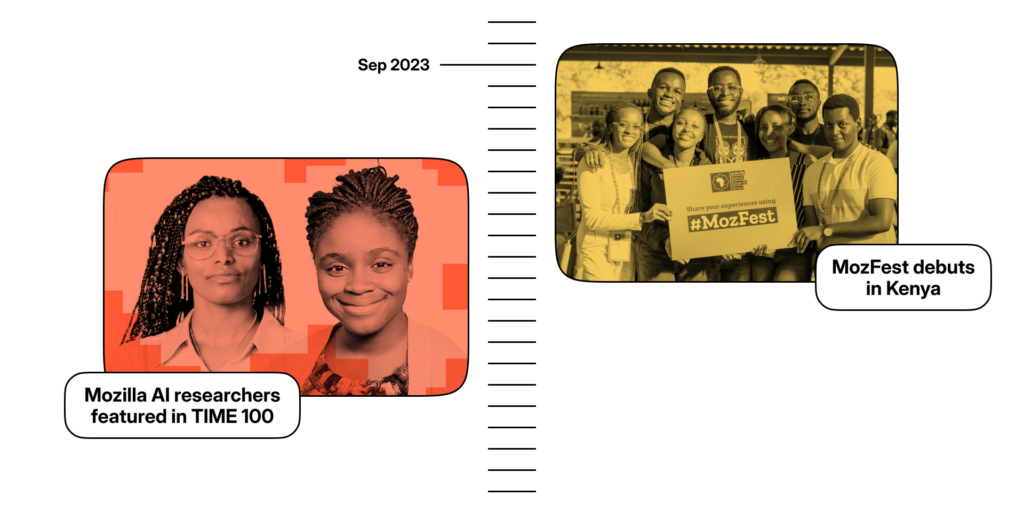
Mozilla Festival’s House debuted in Kenya embodying Africa Innovation Mradi work through confronting pressing realities at the intersection of emergency technology and the African continent, including digital extractivism and AI governance. MozFest House Kenya featured over 20 sessions aligned under the theme “Mobilizing African Communities for Trustworthy AI.”
Mozilla Trustworthy AI researchers, Inioluwa Deborah Raji (Mozilla Fellow) and Abeba Birhane (Senior Adviser in AI Accountability at the Mozilla Foundation) were named to the TIME100 Most Influential People in AI.
Mozilla announced the availability of its AI Guide, a collaborative and interactive web resource that serves as the starting point for developers diving into the world of AI, especially large language models (LLMs). Not only do developers get access to learning modules and curated tools, they can also contribute through Github, making this a community-powered learning tool.
AI Leaders from around the world, including Mozilla convened near London for the AI Safety Summit organized by the UK government. In a joint declaration, the countries attending the summit pledged to collaborate on AI safety just as Parliament announced the formation of an AI Safety Institute.
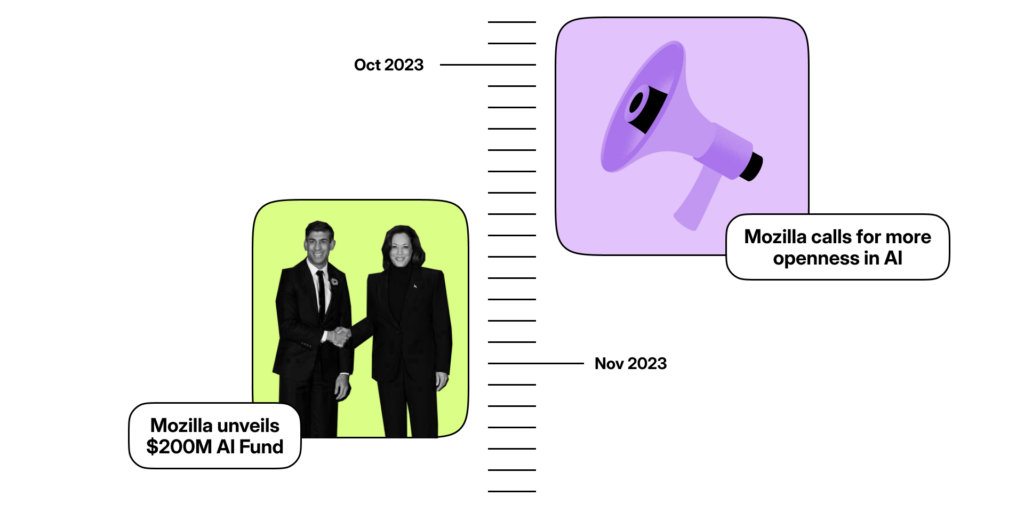
Ahead of the Summit, Mozilla published a joint statement on the importance of openness for AI safety with collaborators in the open source community. The statement included 1,800+ signatories, including Nobel Peace Prize winner, Maria Ressa, and several government ministers.
Mozilla co-signed an open letter to Prime Minister Rishi Sunak emphasizing the lack of civil society representation at the Summit.
The White House released a sweeping executive order on AI. The executive order covers a wide range of issues, from safety and security to privacy to civil rights and consumer protection. Mozilla President, Mark Surman spoke with numerous policy media including Gizmodo and Fedscoop to advocate for the importance of AI governance to advance privacy and open-source development in AI.
Mozilla joined a coalition of 10 leading philanthropies, with leadership from US Vice President Kamala Harris, to invest $200 million in a more trustworthy AI ecosystem. In the coming years, the 10 philanthropies will focus their grantmaking on five key areas identified by Vice President Harris including the intersection of AI with democracy, international rules, and workers’ rights.
Fakespot Chat is a new AI agent that Mozilla started testing as Mozilla’s first LLM. Fakespot Chat, currently available to 100% of Fakespot.com users, serves as a shopping guide, answers your product questions, suggests questions, and recommends alternatives so you can buy with confidence. It serves as an online shopping guide, creating an experience similar to talking to a customer service person while in a physical store. Fakespot Chat uses AI and machine learning to find the answers from product reviews, filtering out fake reviews to help shoppers not only save time, but also trust their purchasing decisions.
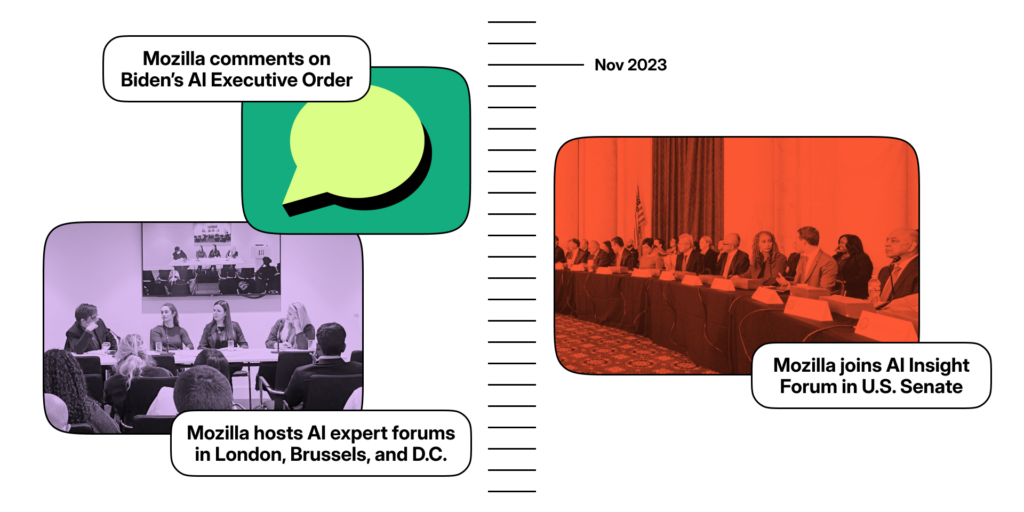
Mozilla Foundation President, Mark Surman, spoke with members of the US Senate, including Senator Leader Schumer, Senator Rounds, Senator Heinrich and Senator Young about two of what Mozilla believes are the most critical questions we must ask if we’re to chart a better path forward with AI: Howe can we protect people’s privacy in the AI era? And how can we ensure that those who cause harm through AI can be held both accountable and liable?
Moez Draief, Director of Mozilla.ai presented Mozilla’s stance on open source AI and addressed issues around technical liability before the UK’s House of Lords’ Communications and Digital Committee during a formal inquiry into LLMs.
At our ‘Mozilla Meetup’ event in Washington, D.C. Our SVP of Innovation Ecosystems, Imo Udom, engaged in a fireside chat with the White House Deputy CTO — focusing on the intersection between AI, open source, and privacy — followed by a panel discussion featuring experts from the Senate, civil society, and academia. Over 80 people attended the event.
Mozilla hosted a Policy Talks panel in Westminster, London where our VP, Global Policy, Linda Griffin discussed the nuances of open source AI and how to balance innovation with safety. Panelists included various AI policy experts and featured Alex Davies-Jones, Member of Parliament, and an associate director from the Ada Lovelace Institute, an independent research institute with a mission to ensure data and AI benefit society.
Mozilla also reintroduced ‘Mozilla Mornings’ in Brussels. The event highlighted the interplay of AI with open markets and competition, and included a keynote by a Member of the European Parliament.
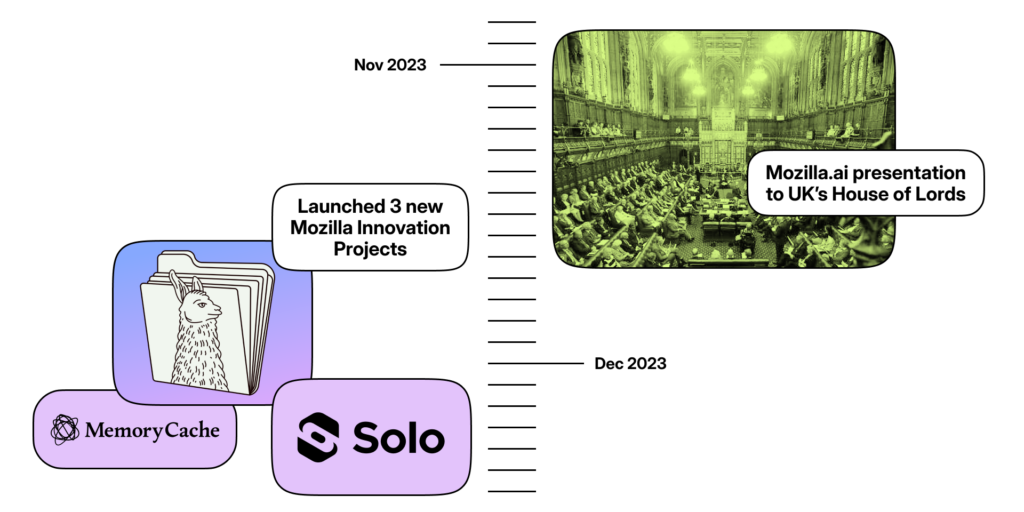
Mozilla CEO, Mitchell Baker defended open source values and discussed AI’s societal impacts with the Generative AI Committee set up by the French Prime Minister in Paris.
Mozilla announced several AI-based innovation projects we are working on that explore the vast AI opportunities that exist, and invited the Mozilla community to join us in collaborative conversations on our AI Discord.
Mozilla shared with the public three new experimental, prototype tools — an AI website builder for solopreneurs, Solo, an innovation project that augments an on-device, personal model with local files saved from the browser to reflect a more personalized and tailored experience through the lens of privacy and agency, MemoryCache, and llamafile, an open-source initiative that collapses a full-stack LLM chatbot down to a single file that runs on six operations systems.
